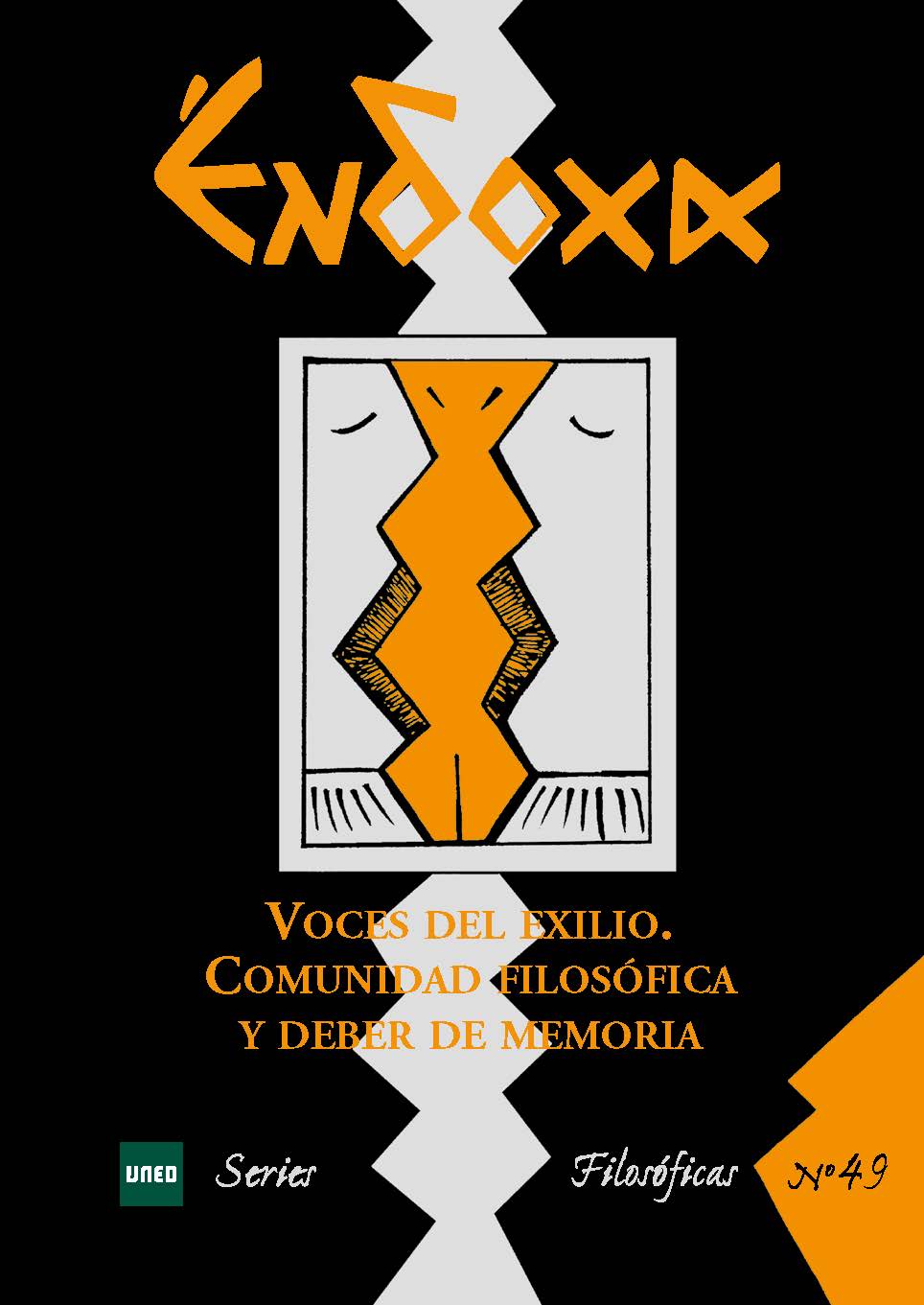Heideggerian Elements in the Thinking of García Bacca
DOI:
https://doi.org/10.5944/endoxa.49.2022.33323Keywords:
Contemporary thought, rationality, vitalism, existentialismAbstract
García Bacca began an intellectual cycle in 1936 with a new philosophical project, which points the direction of the rest of his work. He adds to Kant’s Copernican turn the “transcendental function of feelings” as an interpretation of understanding. I propose, in the first place, to understand these theses as the hard core of the hermeneutical place from which García Bacca dialogues with Heidegger; and I understand this dialogue as a permanent element in his work until 1985, not as a mere interpretation of Heidegger’s theory but as an example of his own practice of philosophy. Secondly,
this article analyzes the theoretical strategy of García Bacca, who proposes a new anthropologically based ontology, and connects the actuality in philosophy with
the changes in the foundation of science and the deep historical modifications. A special place takes the analysis of dismantling, understood as a constructionist and critical way of proceeding philosophy, that García Bacca opposes to the Heideggerian
program of metaphysical destruction.
Downloads
References
García Bacca, J. D. (1936). “Concepto de una introducción a la filosofía”, Revista de
Psicología i Pedagogía, Barcelona, vol. V, n.º 14-15. Debo la noticia de este texto, y
el acceso a él, a la investigación bibliográfica de Alberto Ferrer, a quien expreso mi
agradecimiento.
— (1940). Invitación a filosofar I. México, F.C.E.
— (1941). Tipos históricos del filosofar físico. Desde Hesiodo hasta Kant, Tucuman. Universidad Nacional, Prólogo sin paginación.
— (1944). Hölderling(sic) y la esencia de la poesía, México, Séneca.
— (1962). Existencialismo. Xalapa, México, Universidad Veracruzana.
— (1963). Metafísica natural estabilizada y problemática metafísica espontánea, México,
F.C.E.
— (1982). Antropología filosófica contemporánea, Barcelona, Anthropos.
— (1984a). Tres ejercicios literario-filosóficos de moral, Barcelona, Anthropos.
— (1984b). Tres ejercicios literario-filosóficos de antropología, Barcelona, Anthropos.
— (1985). Parménides (s. V a.C) – Mallarmé (s. XIX de. C.). Necesidad y azar, Barcelona,
Anthropos.
— (1989a). Hölderlin y la esencia de la poesía, Barcelona, Anthropos.
— (1989b). De magia a técnica. Ensayo de teatro filosófico-literario-técnico, Barcelona.
Anthropos.
— (1991a). Curso sistemático de filosofía actual, Caracas. Alfadil.
— (1991b). Sobre el Quijote y Don Quijote de la Mancha. Ejercicios literario-filosóficos,
Barcelona, Anthropos.
— (2000). Confesiones. Autobiografía íntima y exterior, Barcelona, Anthropos.
— (2018). “Autobiografía íntima”, en re/incidencias, nº 10, Revista del Centro Cultural
Benjamín Carrión, Quito (Ecuador), pp. 200-226.
Gaos, J. (1989). La filosofía de la filosofía, Barcelona, Crítica.
Kant, E. (2009). Crítica de la razón pura, México, F.-C.E. Edición bilingüe de Mario
Caimi.
Published
Versions
- 2022-06-27 (2)
- 2022-06-27 (1)
How to Cite
Issue
Section
License

This work is licensed under a Creative Commons Attribution-NonCommercial-NoDerivatives 4.0 International License.
The authors who publish in this journal must agree to the following terms:
- The authors hold author’s rights and guarantee the journal the right to be the first to publish the work as well as the Creative Commons Attribution License which allows others to share the work as long as they acknowledge the authorship of the work and its initial publication in this journal.
- The authors can establish, on their own, additional agreements for the non-exclusive distribution of the version of the work published in the journal (for example, placing it in an institutional repository or publishing it in a book), always acknowledging the initial publication in this journal.
- The authors are allowed and encouraged to disseminate their work electronically (for example, in institutional repositories or on their own webpages) before and during the submission process, as this can give rise to productive exchanges, as well as earlier and increased citing of the works published (See The Effect of Open Access).







